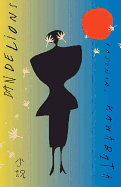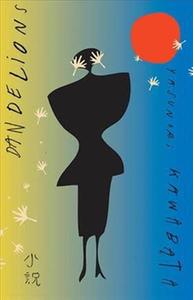
 Yasunari Kawabata (Beauty and Sadness) was the first Japanese writer to win the Nobel Prize for Literature. Dandelions, whose prevalent themes are madness and suicide, was left unfinished when he committed suicide in the spring of 1972. In the small town of Ikuta in early spring, the yellow flowers are proliferating along the river bank and creating a wild and somehow unaccountable luminosity of color. This metaphor crops up in the lives of young lovers Ineko and Kuno. Ineko is committed to a mental hospital in the town after suffering from "body blindness," a condition in which she loses sight of physical objects in her periphery, including her lover's body during sex. Later on, it's revealed that mysterious images, like rainbows of bubbles, replace her impressions of physical objects. Like the dandelions around town, these images evoke the resplendent impermanence of life, something that emotionally tortures Kawabata's characters.
Yasunari Kawabata (Beauty and Sadness) was the first Japanese writer to win the Nobel Prize for Literature. Dandelions, whose prevalent themes are madness and suicide, was left unfinished when he committed suicide in the spring of 1972. In the small town of Ikuta in early spring, the yellow flowers are proliferating along the river bank and creating a wild and somehow unaccountable luminosity of color. This metaphor crops up in the lives of young lovers Ineko and Kuno. Ineko is committed to a mental hospital in the town after suffering from "body blindness," a condition in which she loses sight of physical objects in her periphery, including her lover's body during sex. Later on, it's revealed that mysterious images, like rainbows of bubbles, replace her impressions of physical objects. Like the dandelions around town, these images evoke the resplendent impermanence of life, something that emotionally tortures Kawabata's characters.
Much of the novel revolves around the relationship between Kuno and Ineko's widowed mother, simply referred to as "Mother." The two spend a night together in a rundown inn after leaving Ineko in the hospital. Ineko's painful story is revealed through their dialogue and flashbacks: her father was a military officer in World War II who wanted to kill himself after Japan's humiliating defeat. He was saved by a mysterious girl--likened to a sprite--and later fell to his death while horseback riding along the ocean. Ineko witnessed his death and internalized the trauma. Both she and her mother feel guilt for the accident and ponder the workings of fate that led to it. The night in the inn, Mother and Kuno argue about who or what is ultimately responsible for the past. Kawabata builds an interesting sexual tension between them. Missing her husband--and the way she was defined by him--Mother covets Kuno's amorous obsession with her own daughter.
The novel ends prematurely, yet thematically, and still feels like a whole, worthwhile experience; Kawabata packs so much conflict and intrigue into his characters. Emmerich's English translation renders the novelist's prose style as poetic, with a strain of magical realism. Kuno is sure he sees an impossibly white rat by the river. Mother swears a little boy she meets is a fairy. Patients at the hospital ring an old temple bell, filling the town with an eerie sound: "the long, lingering hum of the bell seemed always on the verge of fading into nothing, but never did." It's hard to know if Dandelions is better or worse off for its incompletion. As it stands, the novel is a deeply absorbing meditation on love, madness and the sinuous designs of fate. --Scott Neuffer, writer, poet, editor of trampset
Shelf Talker: Nobel Laureate Yasunari Kawabata's unfinished novel ruminates on the beauty and sadness of human love.

